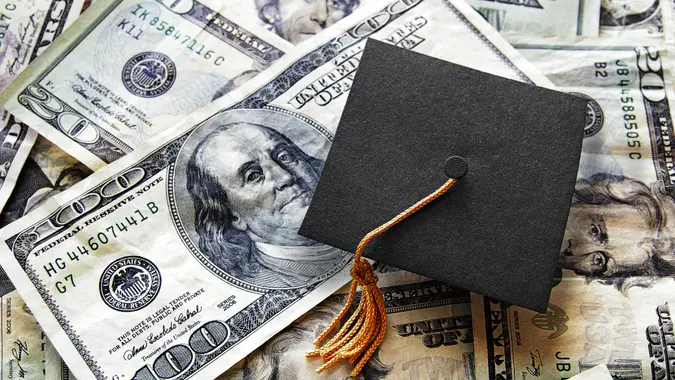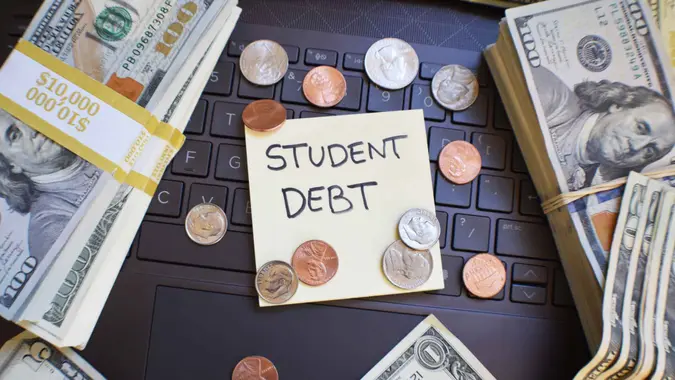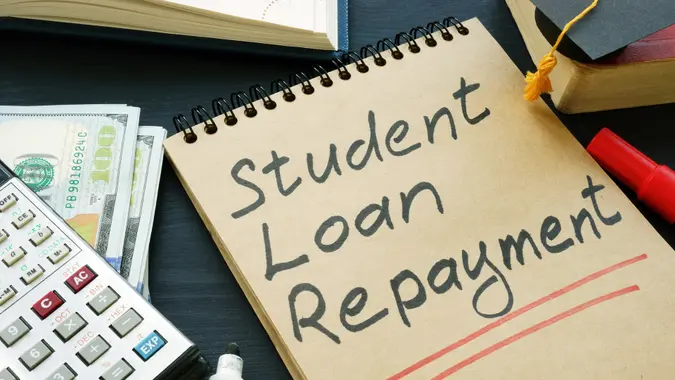Experts Say To Do These 5 Things for Your Student Loans During Election Year

Commitment to Our Readers
GOBankingRates' editorial team is committed to bringing you unbiased reviews and information. We use data-driven methodologies to evaluate financial products and services - our reviews and ratings are not influenced by advertisers. You can read more about our editorial guidelines and our products and services review methodology.

20 Years
Helping You Live Richer

Reviewed
by Experts

Trusted by
Millions of Readers
With the student loan grace period having ended on Sept. 30 and a presidential election looming, your college debt might be feeling heavier than a freshman’s backpack on the first day of classes. But don’t sweat it! Here’s some expert advice to help you navigate these choppy financial waters.
Here are five things the pros say you should do for your student loans during this election year.
Get Back in the Repayment Groove (But Take It Slow)
Entrepreneur Rene Lacad shared this wisdom about easing back into repayments: “Take it slow as you start repaying your loans. It might take some time to readjust your budget after a break!”
He wasn’t kidding! After years of not having to think about those pesky payments, your wallet might be in for a shock.
Lacad suggested “cutting out crucial expenses and ensuring your student loan repayment is factored into your regular spending routine.” Remember, Rome wasn’t built in a day, and your repayment strategy doesn’t have to be, either. Just make sure you’re making your minimum payments on time.
Explore Your Options (But Be Aware of Limitations)
Brandon Galici, CFP and founder of Galici Financial, recommended exploring federal loan options. But, he said, “The popular Income-Based Repayment (IBR) plan is currently affected by legal battles. While you can still submit a paper application, processing times are slow.”
So, what exactly should a borrower do?
“Contact your loan servicer to discuss options like deferment or forbearance” if you’re struggling to make payments, Galici said. You just have to remember that these are temporary solutions, and you need to work toward a more comprehensive plan.
Stay Informed (Because Knowledge Is Power)
With an election on the horizon, student loan policies are absolutely something you should be watching. Lacad said, “Observing the news from sources will help you take advantage of any opportunities that may come your way.”
Although no one can predict the future, the next president might affect whether or not student loan payment is easier or harder. In the meantime, focus on making your payments.
Consider Refinancing (But Proceed With Caution)
Refinancing obviously sounds tempting, especially if you can get a lower interest rate. But Thomas J. Brock, CFA and expert with Annuity.org, said, “It is wise to avoid making any permanent moves right now, such as refinancing your federal loans into private ones. This could disqualify you from future forgiveness programs and other relief measures.”
In other words, don’t let your desire for a lower rate today cost you potential benefits tomorrow — especially while the political climate for the next four years has yet to be determined.
Prioritize On-Time Payments (Your Credit Score Will Thank You)
Galici said, “On-time payments account for 35% of your credit score, and the consequences of late payments are severe.
And he was telling the truth — a single late payment could drop your credit score by 20-80 points. That’s serious.
And if you think that’s bad, Galici pointed out that after 270 days, “federal student loans can go into default, allowing the Education Department to garnish wages or take tax refunds without a court order.”
Moral of the story? Pay on time, every time.
 Written by
Written by  Edited by
Edited by 

























